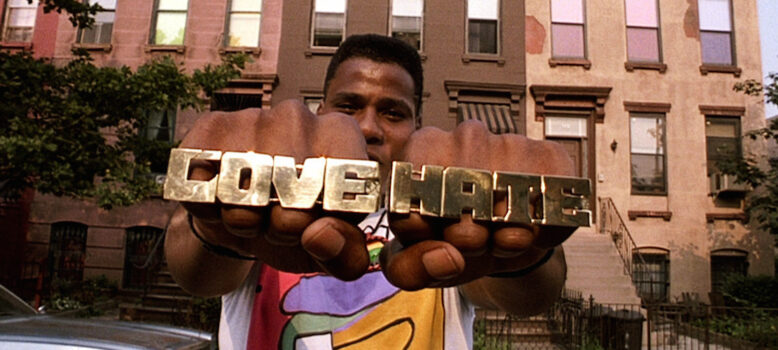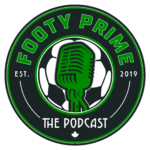
Hip Hop’s 50th: Spike Lee’s Do The Right Thing is still the best political movie ever made

I was just 13 when Mookie threw that garbage can through the window of Sal’s Pizzeria, and at the time I had no idea why I was so upset.
Do The Right Thing, the 1989 Spike Lee joint about a Brooklyn neighbourhood dealing with a summer heatwave and racial unrest, served as the first domino in my interest in politics. Truth be told, I had no idea what politics were until I saw that movie, and my first taste was one of the most robust stories of racial politics ever seen on the big screen.
Robin Harris passed away 33 years ago today. 🙏🏿🕊
Do The Right Thing(1989) pic.twitter.com/vgbuwhikvr
— Hellastalgia (@hellastalgia) March 18, 2023
Against the backdrop of Brooklyn brownstones, the film utilized Lee’s signature directorial style, accentuated by the low budget in a way that didn’t make it feel low budget, and translated the racial strife between black residents and the New York City Police Department.
Lee’s character Mookie worked for the lone white-owned business on the block, Sal’s Pizzeria. Sal and his two sons represented the spectrum of racial ignorance and acceptance, while Mookie’s tightwire dance between community and livelihood punctuated the complex ecosystem of race relations in America.
On this day in 1989 💫
Public Enemy make the video for "Fight The Power," directed by #SpikeLee, in Brooklyn. The shoot doubles as a rally, with locals joining in to serve as extras. The song later debuts on the soundtrack to Lee's film Do The Right Thing.#PublicEnemy 😎🙏🎶 pic.twitter.com/UiJM5J9vUW
— 🎶When it hits you feel no pain🎶❤✌ (@Concert_Feeling) April 22, 2022
There are so many crucial characters and moments in this film, from Radio Raheem and his Love/Hate gold knuckles, to the Mayor’s drunken trepidation as he dispenses wisdom and tries to keep the peace despite the impending powder keg. Throughout the film we hear Public Enemy’s 1989 classic Fight The Power, a constant foreshadowing of the film’s epic climax where Mookie sparks a riot after Radio Raheem is killed by police.
SPIKE LEE talking about his 1989 classic, DO THE RIGHT THING. pic.twitter.com/xGluqP6waX
— All The Right Movies (@ATRightMovies) February 17, 2023
Having Do The Right Thing as my cherry-breaking experience into the confusing world of politics was probably the greatest stroke of luck I’ve ever had. The film confused me, challenged me, inspired me, and forced me to look past the lily white neighbourhood I grew up in and into the eyes of civil rights. It made me furious. It made me think. It made me wonder why I gravitated towards hip hop culture so much.
In the Sopranos, Tony once mused that the Jews and Italians were a lot alike, “only we have better food.” In a way, I see hip hop as a version of punk culture, only we got better music.
“Do the Right Thing” (1989) pic.twitter.com/7HhhlG4nVr
— Shtreetwear (@Shtreetwear) March 17, 2023
A part of me views my passion for hip hop through the lens of this film alone. Watching it made me want to do so many things I normally wouldn’t have thought of, such as cleaning my Air Jordans, or walking around my neighbourhood with my own ghetto blaster, or even challenging the status quo as to what rules should be followed, and which ones should have a garbage can thrown through it.
You could taste the racial divide in this movie like you could almost taste a slice of Sal’s pizza. You could see the tension as easily as you could see the lack of melanin on the wall inside the restaurant, and it made you want to correct the wrongs. Instead, you watched these characters dance inside each other’s fears and hatred until everyone collapses under the weight of injustice and anger.
One might say the film, given the events over the past 5 years, is timeless.
This year is Hip Hop’s 50th birthday, and while I’ll be working to bring some of the best representatives in hip hop culture to my podcast, Blackballed. And whenever I want to revisit the birthplace of my own journey into politics, all I have to do is watch this movie.
As Hip-Hop was in its ascendancy, @Spike_Lee_Joint helped the music and the message reach a larger audience and in the process it elevated his work as well. Happy Born Day to the man with the vision! Do the right thing and drop your fav #SpikeLee movie ⬇️🎂 pic.twitter.com/RhrVHeZwf2
— Rock The Bells (@RockTheBells) March 20, 2022
March 20th is Spike Lee’s birthday. He will be 66 years old. He was just 32 when his movie debuted.
If you haven’t seen it, lucky you, because I’d do anything to see it again for the first time.









